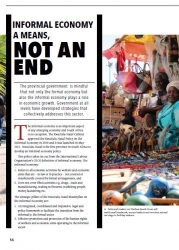Informal Economy A Means, Not An End - Pivot2017-06-12 The provincial government is mindful that not only the formal economy but also the informal economy plays a role in economic growth. Government at all levels have developed strategies that collectively addresses this sector.
The informal economy is an important aspect of any emerging economy and South Africa is no exception. The KwaZulu-Natal Cabinet approved the KwaZulu-Natal Policy on the Informal Economy in 2010 and it was launched in May 2011. KwaZulu-Natal is the first province in South Africa to develop an informal economy policy. This policy takes its cue from the International Labour Organisation’s (ILO) definition of informal economy. The informal economy:
In addition, the fundamental right to earn a living and partake in entrepreneurial activities is preserved. Generally, people enter the informal economy, not by choice, but as a consequence of the lack of economic opportunities and in the absence of other means of livelihood. Historically, the informal economy has had no legislation, but was a sector that was considered a nuisance.Traders who generally operate on the streets were routinely harassed by law enforcement agencies, forcibly removed off the streets and often had their goods confiscated. Often informal traders set up shop around taxi ranks, on the sides of busy access roads, outside schools and clinics or at tourist attractions. In many cases, the challenges include insufficient space, lack of infrastructure and facilities, unfair competition from bigger businesses, no access to business support, and a lack of finance. The KwaZulu-Natal Policy on the Informal Economy recognised that informal trading was not going to be easily dismissed. More recently the provincial government has acknowledged that this sector is here to stay and that it needs to be dealt with more proactively as informal traders play an important role in promoting economic development and job creation. The policy proposes that a developmental, rather than regulatory approach needs to be implemented. However, the policy also ensures that more control over who is eligible to trade is established as well as ensures that trade is monitored and illegal activity has less opportunity to prosper. The registration process proposed will allow the development of databases, which will assist with the issuing of permits, research, management and planning. The policy makes certain that deliberate avoidance of business legislation and regulation, including social labour laws is curtailed. The informalisation of formal economy jobs is also prevented in this process. The identification of different economic categories and activities, the regulatory requirements of each business as well as the opportunities available are key to developing effective management systems. A case in point is the operation of food outlets and taverns, which require specific licensing and adherence to health and safety legislation. On a provincial level interventions in the local economy are coordinated and directed by the Business Regulation Directorate of the Department of Economic Development, Tourism and Environmental Affairs. In order to accommodate the sector, the provincial informal economic policy resulted in the establishment of informal business chambers at district and municipal levels. A further aim of the chambers is to encourage social dialogue, including the right to freedom of association among employees and workers. Each municipality has to develop localised sites to accommodate informal traders. All traders are then allocated specific sites and require permits to operate. This development has necessitated the establishment of less harsh municipal bylaws. Part of the challenge of meeting the needs of the informal economy has been in the capacitation of municipalities with plans and tools through developing guidelines and policies. The informal policy requires that municipalities:
Of importance it is not the intention that informal traders stay locked in to small scale endeavours but that they grow and are developed through skills training, business registration etc. to participate in the formal economy. In order to facilitate this growth access to technology, infrastructure, and business services needs to be provided. The goal of the municipal and district chambers' economic chambers is to work in partnership with local municipalities and local trader associations to provide specialised support and skills development programmes. In this regard the progress to participation in the formal economy by informal traders will be monitored and evaluated in order to realise decent work for all. It is intended that the informal economic strategy and implementation plan, that is still to be adopted by the KwaZulu-Natal Executive Council will be used to drive the promotion and upliftment of informal businesses in the province. |
Informal Economy A Means, Not An End - Pivot
Copyright © 2024 KwaZulu-Natal Top Business
